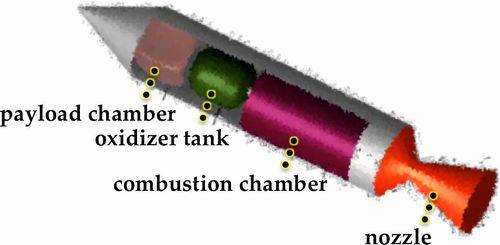High performance of single stage sounding hybrid rockets using design informatics

Single-stage sounding rockets are used to transport scientific equipment into, or just beyond, Earth's atmosphere to measure phenomena such as aurora. Recently, scientists have begun designing rockets with hybrid engines, which work by alternating between different phases of solid fuel and liquid or gas oxidizers. Hybrid rockets are cheaper, safer and cleaner than those with conventional solid fuel engines.
While hybrid rockets are still largely in the design and prototype phase, there has been considerable progress in the design technologies used to model and predict optimal rocket performance. Now, Kazuhisa Chiba at the University of Electro-Communications in Tokyo, together with scientists across Japan, have demonstrated the potential advantages of an 'extinction-reignition' protocol in hybrid rockets using a novel design informatics (DI) platform.
Computer-based DI allows researchers to investigate hybrid rocket advantages during concept design by illustrating many elements of the physics of rocket launch and flight in one 'bird's eye view' design space. Chiba's team wished to determine whether firing the rocket engines more than once ('extinction-reignition') was beneficial to the overall flight path stability, distance and duration of flight in the lower thermosphere.
The team ran the computer model thousands of times, each time tweaking different variables - such as extinction time between first and second combustion - to determine the potential advantages of an extinction-reignition protocol and the optimal rocket design. Their results indicate that, while downrange distance was not extended, the time spent in the thermosphere was prolonged. Further exploration of the data generated suggested a hypothesis to extend downrange in future.
More information: Kazuhisa Chiba et al. Extinction–reignition superiority in a single-stage sounding hybrid rocket, Aerospace Science and Technology (2016). DOI: 10.1016/j.ast.2016.09.010
Provided by University of Electro Communications





















